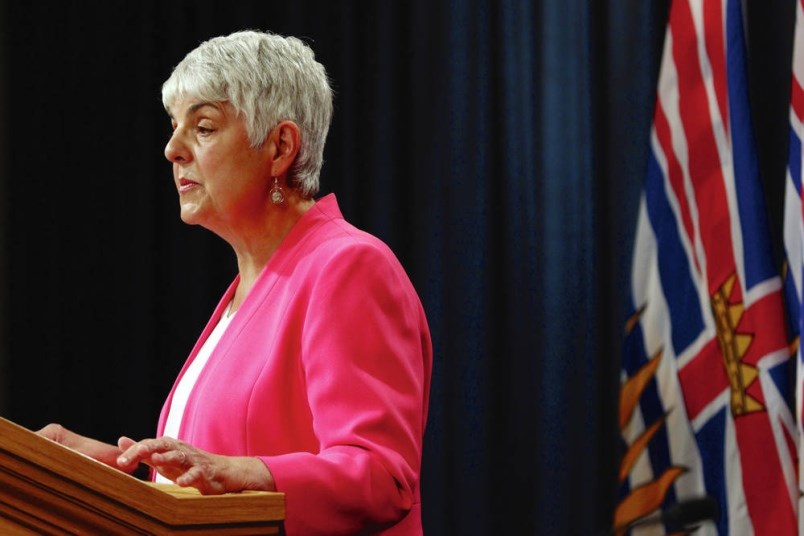Even 10 months of strong growth, booming revenues and a healthy safety cushion weren’t enough to stave off a deficit when COVID-19 hit B.C. in the last few weeks of the fiscal year.
Finance Minister Carole James presented the public accounts for 2019-20 on Monday – the final reckoning for the fiscal year ending March 31 – and they confirm a $321-million deficit that arose out of nowhere, starting when the pandemic hit early in 2020.
It was “inevitable,” she said. It’s a trivial amount on a $60-billion budget, less than half a per cent. But it’s more than a half-billion below the surplus that was expected through the year. And the contrast to the $1.5-billion surplus B.C. posted just a year ago is remarkable.
The first deficit in seven years is just a taste of what is happening to the current 2020-21 budget, which is already at least $13.5 billion in the red because of the increased costs and collapse in tax revenues arising from the pandemic through April to the present.
The picture of B.C.’s fiscal year presented by the finance ministry is that of a pretty parade float that got hit by a truck just as it passed the reviewing stand. The only consolation is that the rest of the parade got wrecked as well.
B.C. posted the third best growth rate in the country, unemployment was below five per cent and revenues in nearly every category were on target or higher than expected.
Everything suggested that budget surpluses would continue and B.C. would carry on as a driver of the national economy. Then the first B.C. case of COVID-19 was identified Jan 28. The first death was recorded March 9. Within two weeks, a provincial emergency was declared, large gatherings were banned, all travel was curtailed, hotels and restaurants were closed or restricted and hundreds of thousands of people were out of work.
The ministry’s multiple layers of forecast allowance and contingency funds were consumed in a matter of weeks. Taxation revenue dropped hundreds of millions of dollars in the last two months of the fiscal year. -Government and health authorities spent an extra $46 million just on internal measures in the last two months of that year, let alone the far higher emergency sums spent supporting people and businesses.
The ongoing countermeasures since then all rely on billions of dollars of new debt.
James has no choice but to carry on with the supports, which she promised to do. “As we look back on that last fiscal year, we can also see that investing in people, services and a sustainable economy is just as critical today, if not more than it was in budget 2019.”
She said B.C. is in a strong position to weather the challenges of the pandemic. But that’s relatively speaking. The province is many times better off than Alberta and others, but no government has the resources to fully support people for much more than 18 months or so.
The full impact of the damage in February and March is partially disguised. Earlier NDP tax hikes created a boost in overall government revenues. The transitional year of double taxation – charging both medical services premiums and the replacement employer health tax – brought in a few hundred million more, as did the carbon tax hike.
Without those funds, B.C. would be even deeper in the red. COVID-19 consumed those bonanzas and every other surplus nickel in the treasury.
The next big chunk of government spending will be announced shortly, as the long-awaited $1.5-billion recovery plan will be unveiled. Also coming this month is the first update on the current fiscal year. It was supposed to have a surplus too, which is now long gone.
Until there’s a confirmed medical breakthrough, B.C. and every other government will be reacting the only way they can, by spending on supports while they eye case counts to judge whether to impose more restrictions. Both moves cost money, either by addressing all the urgent pleas for help, or by stifling the economy through social restrictions.
Instead of taking a national bow for its fiscal performance last year, B.C. can only take cheer in being the healthiest patient in the ICU.
